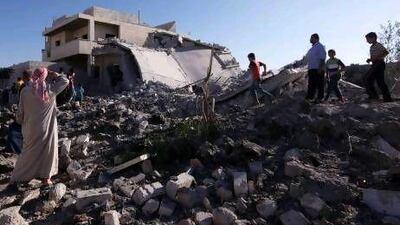MARSEILLE, France // France issued a new warning to President Bashar Al Assad yesterday that western powers would immediately mount a "massive and blistering" response if the Syrian regime resorted to chemical or biological weapons in its attempts to crush revolt.
Without specifying the nature of action Syria would face, Laurent Fabius, the French foreign minister, said broad agreement had been reached in talks "notably with our American and English partners".
His message, in an interview on RMC radio, reinforced a previous warning from the United States.
President Barack Obama said last month that American military intervention would follow in the event of unconventional arms being moved or prepared for use.
The Syrian leadership is suspected of having stocks of nerve and mustard gas, and Scud missiles with which to deliver them.
It has not directly threatened to use such weapons against rebel forces fighting a civil war aimed at bring down the Assad regime, but has said they could be deployed if the country were attacked from outside.
Foreign intervention is precisely what opposition forces want, as the opposition Syrian National Council (SNC) leader, Abdel Basset Sayda, made clear on a visit to Spain yesterday.
"I am going to be very clear, we are requesting military intervention in order to protect Syrian civilians who have been constantly murdered over the last year and a half," he said after meeting the Spanish foreign minister, Jose Manuel Garcia Margallo.
"The European Union should take the initiative and pressure Russia ... so we can lay down some protected areas for refugees."
Mr Margallo pledged Spanish commitment to attempts to mould a united EU approach and urged Syrian opposition groups to overcome their divisions.
The comments in Europe followed strong words from the Gulf Cooperation Council, which on Sunday condemned the Assad regime's use of heavy weapons to inflict "continuing massacres" on civilians.
Meeting in Jeddah, the GCC - representing the UAE, Saudi Arabia, Bahrain, Oman, Qatar and Kuwait - called on the international community to "assume their responsibilities and take measures to protect civilians".
France, which administered Syria as part of a League of Nations mandate from 1923 to 1943, has recently been intensifying its war of words against Mr Al Assad and his government.
After opposition criticism of his silence on the conflict, the new socialist president, François Hollande, used an annual gathering of French ambassadors last week to urge dissident groups to form a provisional government which, he said, France would instantly recognise.
Mr Fabius said Russia and China held "the same position" on chemical arms though he did not explain this further and also spoke of frustration at the continued support they offered Mr Al Assad.
Both countries have used their vetoes at the UN Security Council to block attempts by the US and Arab nations to impose sanctions on Damascus.
The Russian deputy foreign minister, Gennady Gatilov, insisted in a recent interview with Associated Press that his country, Syria's major arms supplier, had been assured by Mr Al Assad's government that chemical and biological would not be used. He added that Moscow would "work toward the goal of preventing such things from happening".
China has argued from the outset of the uprising that a negotiated settlement, and not external interference, was needed in Syria.
Meanwhile, the UN's new envoy to Syria, Lakhdar Brahimi, conceded yesterday that finding a way to end the civil war was a "very, very difficult task" and indeed "nearly impossible".
In Damascus, Mr Al Assad's information minister, Omran Al Zoebi, said Syria would give the UN envoy "maximum assistance the way we did with Kofi Annan", an assertion GCC and western powers are likely to treat with suspicion.
The SNC says the conflict had already cost 30,000 lives, led to 100,000 people being detained and driven millions from their homes.
Violence continues on a daily basis. A deadly car bomb tore through a mainly Christian Damascus suburb yesterday while Syrian warplanes pounded Aleppo province, killing dozens of people, as the opposition pleaded for arms and intervention. The violence came as the chief of the Red Cross headed to Damascus on a humanitarian mission, his office said.
At least 18 people were killed yesterday in the northern town of Al Bab, 30 kilometres from the Turkish border; when government aircraft attacked a residential area, according to the Syrian Observatory for Human Rights, based in Britain, and local coordination committees. Activists, meanwhile, reported scattered violence in regions across the country and said that more than 100 people had been killed yesterday.
The Syrian army will recapture Aleppo from rebel forces within 10 days, a senior commander in charge of the five-week military offensive on the commercial capital said yesterday The city would fall once Saif al-Dawla, one of the two "toughest" neighbourhoods, was conquered as the other, Salaheddin, had already been seized back from the "terrorists" concentrated in the two areas, the general said on condition of anonymity.
* With additional reporting by Associated Press and Agence France-Presse


